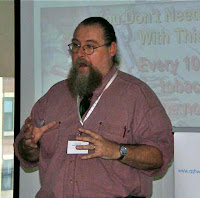
Handsel Art
7 October 2009
FOR IMMEDIATE RELEASE
contact J.R. Few
handselart@marioncounty.com
or 870-427-1365
Local Advocate Speaks in Wales
Tobacco prevention in Marion County, Arkansas acquired international note last week with local activist, J.R. Few’s presentation at the second annual ASH Wales’ Communicate, Collaborate, Celebrate Conference in Cardiff, Wales October 5 & 6. Speaking during the “Engaging Smokers” workshop, Few shared insight and successes from work as volunteer media coordinator for Tobacco Free Marion County between 2002 until 2009.
“It was an honor and a privilege to be invited to this event. The challenges to the tobacco industry are truly global. We get caught up in our own local mediocrity and often forget that the world at large is where the tobacco industry profits most.”
Few is creative director for his family’s business, Handsel Art and Advertising. Handsel Art has offered to the public quality art, advertising, public relations, and photography since 1971 and currently works to challenge a predatory rogue industry with tobacco prevention activists in Arkansas and around the globe.
###
The primary sponsors for the event were Pfizer and McNeil and because of this the conference is subject to the same critique the World Conference on Smoking or Health in Mumbai received. The fashion in which we engage the tobacco pandemic should be evidence based. But the slippery aspect of saying something like that is that the paradigm from which one begins shapes the questions and evidence one seeks. It is a very good question to ask if having these corporate sponsors determines the flavor of a conference. And these particular sponsors are involved quite directly with profit from using their products to treat nicotine addiction, not control and prevent the prevalence and spread of nicotine.
That said, the gathering was certainly a cessation based perspective but with a serious effort at broadening the scope. I got the impression that tobacco prevention advocates were beginning to feel the frustrations that they may have maxed out the utility of a certain direction of effort.
The challenge to tobacco in the UK has been a decade of the National Health Service focusing on cessation. This of course couldn't make the industry any happier because they are more aware than anyone how difficult, even impossible, overcoming nicotine addiction can be. However, this seems to be on the cusp of change. It made my presentation about adhering to best practices and strict media tie in very appropriate. They are only now getting the knack of their foe being the industry itself. John Tilley, speaking for NHS, noted that a new national tobacco policy was imminent. The last session we attended outlined the 2008 report of the Tobacco Control National Support Team suggesting an evidence based approach much like the CDC Best Practices for engaging the industry. Wales itself is seeking a unified national tobacco policy. This conference, only the second for ASH Wales I believe, is part of that effort. In many ways Arkansas is far ahead of the game, especially for Wales. And even the UK too.
My gig actually went over pretty well. I'm large and loud and had lots of colorful slides. Additionally my "Kill 'em all, let god sort it out" approach to the tobacco industry was fairly novel for much of the audience. And the numbers I was able to bring from our efforts in Marion County were a pretty straight forward approach to successful tobacco control. But we know from experience in Arkansas that doesn't mean anybody is listening. Additionally, the English have the same difficulties w ignorant politicians pandering to the lowest common denominator and eating out of the hands of the industry whether they know it or not.
It truly was an enlightening honor and privilege to attend the ASH Wales Conference and speak to so many dedicated advocates. I believe we made some friends with whom collaboration and communication will have a positive challenge to the tobacco industry. Might be a little early to celebrate.


